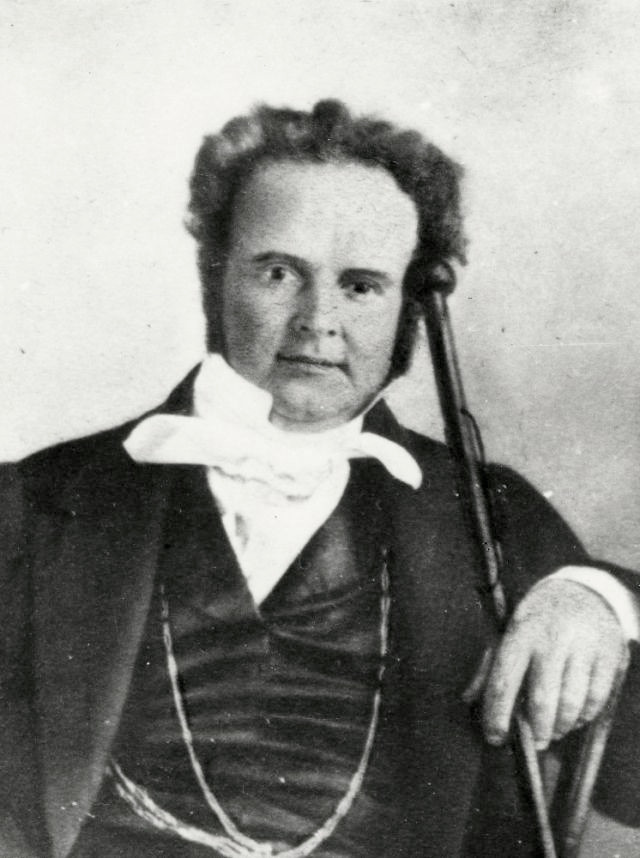Willard Richards
(1804-1854)


By Susan Easton Black
Willard was religiously inclined as a youth. He sought truth at revival meetings and by attending the Congregational Church in Richmond, Massachusetts. But when his request for admission into the Congregational Church was not acted upon, he reached the conclusion that all religious sects were wrong. Rather than continue to attend religious meetings, he decided to wait until the Lord established His church.
As he waited, Willard turned his interests from the religious sects of his day to academics. He read much on science and began lecturing on electricity and other scientific subjects until narrowing his studies to medicine in 1834. As a student at the Thomsonian Infirmary in Boston, he focused on the value of herbs in curing the sick. By summer of 1835, he had set up a Thomsonian medical practice near the bustling harbor in Boston.
In Boston, Willard first learned of the restored Church from newspaper editorials featuring “a boy named Jo Smith, somewhere out west, [who] had found a Gold Bible.”1 Willard acquired a copy of the “Gold Bible” and began to read. “God or the devil has had a hand in that book,” he said, “for man never wrote it.” He concluded that there must be a role for him to play in the Restoration, for “God has something greater for me to do than peddle pills.”2 Willard cleared himself of obligations and journeyed nearly seven hundred miles to Kirtland to learn more of the Restoration message.
In October 1836 he arrived in the city of the Saints. As he learned more of the Restoration, he desired to be baptized. A hole was cut in the ice of the Chagrin River for his baptism. On December 31, 1836, thirty-two-year-old Willard Richards was baptized by his cousin Brigham Young. Six months later, Willard left Kirtland to share the gospel of Jesus Christ in England.
From 1837 to 1841, he preached in the communities of Preston, Bedford, Manchester, Bolton, and the surrounding countryside. It was not until 1840, when Brigham Young and other members of the Quorum of the Twelve Apostles arrived in England, that he learned of his call to be an apostle (see D&C 118:6). Willard was ordained on April 14, 1840, in Preston, becoming the first apostle to be ordained outside of North America.
About a year to the date of his ordination, Willard returned to the United States. He resided with his cousin Brigham and then the Prophet Joseph in Nauvoo. His move to Joseph’s home greatly facilitated his work as a secretary, recorder, clerk, and historian for the Church. In November 1841 the Prophet Joseph wrote, “I have been searching all my life to find a man after my own heart whom I could trust with my business in all things and I have found him.—Doctor Willard Richards is the man.”3
Willard was with the Prophet Joseph Smith and his brother Hyrum in Carthage Jail on June 27, 1844. Observing a mob gathering outside of the jail, the jailor suggested that the prisoners would be safer in the cell upstairs than on the main floor. The Prophet Joseph asked Willard, “If we go into the cell, will you go in with us?” He replied,
Brother Joseph you did not ask me to cross the river with you—you did not ask me to come to Carthage, you did not ask me to come to jail with you—and do you think I would forsake you now? But I will tell you what I will do, if you are condemned to be hung for treason, I will be hung in your stead, and you shall go free. 4
In the bedroom of the Carthage jail, Willard witnessed the murder of Joseph and Hyrum Smith (see D&C 135:2). His account “Two Minutes in Jail” gives details of the tragedy.
After the martyrdom of the Church leaders, Willard supported the leadership of the Twelve Apostles. At the direction of Brigham Young, he wrote and preserved Church records. From 1847 to 1854, he served as the Second Counselor in the First Presidency of the Church. On March 11, 1854, in Salt Lake City, he died from dropsy at age forty-nine. He was the first member of the Quorum of the Twelve Apostles in this dispensation to die a natural death. Brigham Young eulogized the life of Willard Richards by saying, “He was as true and unwavering in his course as the sun is to the earth. … There is not a shade of deviation from the principles of righteousness.”5
1. Andrew Jenson, LDS Biographical Encyclopedia (Salt Lake City: Andrew Jenson History Company, 1901), 1:53
2. Lawrence R. Flake, Mighty Men of Zion (Salt Lake City: Karl D. Butler, 1974), 124.
3. Journal History of the Church, November 21, 1841.
4. Smith, History of the Church, 6:616.
5. Deseret News, March 16, 1854, in Flake, Mighty Men of Zion, 124.
Additional Resources
- Biography of Willard Richards (josephsmithpapers.org)
